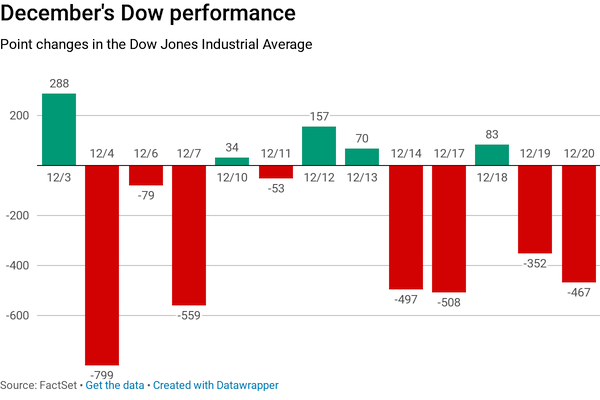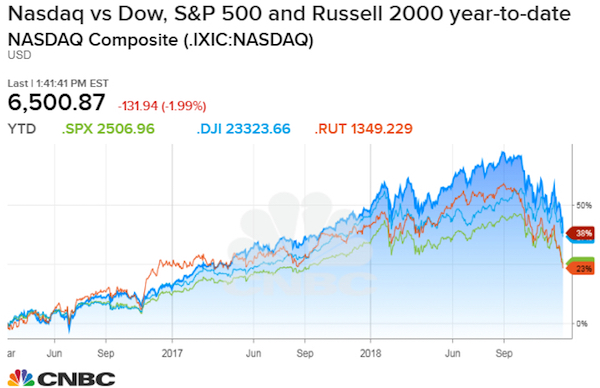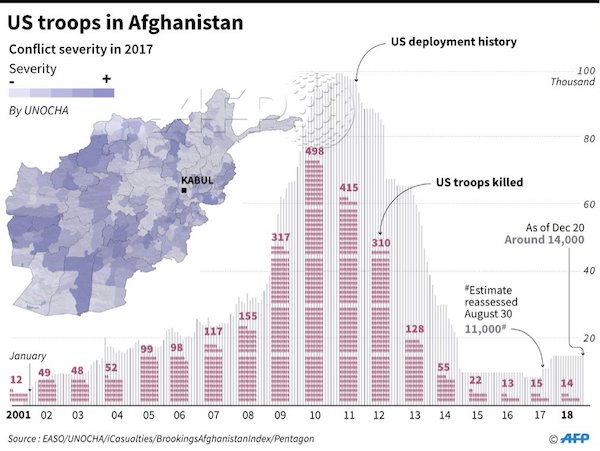
Pieter Bruegel the Elder� Hunters in the snow �1565

Jay Powell pricks the bubbles. Painful and inevitable. But if he ever decides to lower rates again next year, look for the bubbles to return. That’s his dilemma.
• Dow Drops 470 Points To 14-Month Low In Day 2 Of Big Losses After Fed Hike (CNBC)
U.S. stocks swooned for a second day Thursday after the Federal Reserve raised benchmark interest rates and said that it would continue to let its massive balance sheet shrink at the current pace. Fears of a government shutdown also sent stocks tumbling to new lows Thursday afternoon. The Dow Jones Industrial Average fell 464.06 points to 22,859.6, bringing its two-day declines to more than 800 points and its 5-day losses to more than 1,700 points. The S&P 500 fell 1.5 percent to finish at 2,467.41 as technology stocks underperformed. The Nasdaq Composite fell 1.6 percent and closed at 6,528.41, briefly dipping into bear market territory amid big losses in Amazon and Apple.
The Nasdaq is 19.7 percent below its recent high. Companies in the S&P 500 have lost a total of $2.39 trillion in market cap this month. The Cboe Volatility Index — one of the market’s best gauges of marketplace fear — rose above 30. The Dow and Nasdaq posted their lowest closes since October 2017, while the S&P 500 finished at its lowest level since September 2017. The Dow and S&P 500, which are both in corrections, are on track for their worst December performance since the Great Depression in 1931, down more than 10 percent each this month. The S&P 500 is now in the red for 2018 by 7.7 percent.


Yeah, all these experts. Who cares? There’s not nearly enough fear yet.
• As Fear Rises On Wall Street, Strategists Warn The Worst Is Yet To Come (CNBC)
“The market’s in no man’s land,” said Peter Boockvar, chief investment strategist at Bleakley Advisory Group. Stocks have broken through the lows of the year, and technicians are scurrying to find the next support levels. On the S&P 500, he said 2,400 is a potential psychological area of support. The market plunged Thursday against the backdrop of a congressional feud with the White House over a continuing budget resolution, but the markets were more focused on the worries that have been festering over global growth and the potential for recession. “You can guarantee if the government shuts down it’s going to very soon reopen,” said Boockvar.
“This could be a carry through from yesterday, that’s legitimate. The problem now is this is the first time in years in this bull market that people are doing tax-loss selling. That’s helping to exaggerate the move. You’re also having redemptions.” Since the Fed announced its rate hike Wednesday, the Dow was down 815 points. The sharp drop in stocks since early October was unexpected and even more crushing recently, since December is typically a positive time for stocks. The 10 percent decline so far in the S&P 500 is its worst December performance since 1931. If it remains this way, it would the first time ever that December is the worst month of the year for the index.


Have all those people who now say Mattis is the wisest and most balanced in the White House, forgotten why he’s called Mad Dog?
• US Defense Chief Mattis Quits As Trump Pulls From Syria, Afghanistan (AFP)
US Defense Secretary Jim Mattis resigned Thursday, leading a chorus of protests at home and abroad after President Donald Trump ordered a complete troop pullout from Syria and a significant withdrawal from Afghanistan. Trump steadfastly defended his sudden push for retrenchment, vowing that the United States would no longer be the “policeman of the Middle East” and saying the 2,000-strong US force in Syria was no longer needed as the Islamic State group had been defeated. Mattis, a battle-hardened retired four-star general seen as a moderating force on the often impulsive president, made little attempt to hide his disagreements with Trump.
“Because you have the right to have a secretary of defense whose views are better aligned with yours,” Mattis said in a letter to Trump, “I believe it is right for me to step down from my position.” Mattis hailed the coalition to defeat Islamic State as well as NATO, the nearly 70-year-old alliance between North America and Europe whose cost-effectiveness has been questioned by the businessman turned president. “My views on treating allies with respect and also being clear-eyed about both malign actors and strategic competitors are strongly held and informed by over four decades of immersion in these issues,” Mattis wrote. One day after the surprise announcement on Syria, a US official told AFP that Trump had also decided on a “significant withdrawal” in a much larger US operation – Afghanistan.


No government into Christmas?
• House Passes Spending Bill With Border Wall Money, Senate Showdown Next (CNBC)
The House passed a temporary spending bill Thursday with money for President Donald Trump’s proposed border wall, further muddying the scramble to dodge a partial government shutdown by Friday. The chamber approved the measure to keep the government running into February by a 217-185 vote. But the path forward now is murky. The bill likely will not clear the Senate because it includes more than $5 billion for the border barrier, increasing the chances that funding for seven agencies lapses after the midnight Friday deadline. Senators were told Thursday to prepare for potential votes Friday. The chamber convenes at noon. The Senate unanimously approved a bill Wednesday night to keep the government running through Feb. 8 — without border wall money.
Trump insisted Thursday that he would not sign it. It forced House Republicans to include the wall money in the new bill. Both House Minority Leader Nancy Pelosi and Senate Minority Leader Chuck Schumer have flatly said congressional Democrats will not approve wall money. As Republicans need Democratic votes to pass spending legislation in the Senate, a partial shutdown is all but assured if the GOP insists on funding for the barrier. It is unclear if Republicans will abandon that goal in an effort to keep the government running past Friday. During a televised Oval Office fracas last week, Pelosi challenged Trump by saying he did not have the votes for wall money in the House. It turns out he did.

We can do it, but they can’t.
• China Denies ‘Slanderous’ Economic Espionage Charges From US Allies (R.)
China’s Foreign Ministry said on Friday it resolutely opposed “slanderous” accusations from the United States and other allies criticizing China for economic espionage, urging Washington to withdraw its accusations. The United States should also withdraw charges against two Chinese citizens, the ministry said, adding that China had never participated in or supported any stealing of commercial secrets and had lodged “stern representations” with Washington. “We urge the U.S. side to immediately correct its erroneous actions and cease its slanderous smears relating to internet security,” it said, adding that it would take necessary measures to safeguard its own cybersecurity and interests.
It has long been an “open secret” that U.S. government agencies have hacked into and listening in on foreign governments, companies and individuals, the ministry added. “The U.S. side making unwarranted criticisms of China in the name of so-called ‘cyber stealing’ is blaming others while oneself is to be blamed, and is self-deception. China absolutely cannot accept this.” U.S. prosecutors indicted two Chinese nationals linked to China’s Ministry of State Security intelligence agency on charges of stealing confidential data from American government agencies and businesses around the world. Prosecutors charged Zhu Hua and Zhang Shilong in hacking attacks against the U.S. Navy, the space agency NASA and the Energy Department and dozens of companies. The operation targeted intellectual property and corporate secrets to give Chinese companies an unfair competitive advantage, they said.

More of the same: We can do it, but they can’t. The west wants to blame RT for all sorts of stuff beacuse that fits the Russophobe narrative.
• Russian Media Regulator Starts Checking Legality Of BBC’s Operations (R.)
Russia’s media regulator said on Friday it would carry out checks to determine if the BBC World News channel and BBC internet sites complied with Russian law, a move it described as a response to British pressure on a Russian TV channel. Roskomnadzor, the regulator, said in a statement its checks were Russia’s response to a decision by British media regulator Ofcom, which on Thursday said that Russian broadcaster RT had broken impartiality rules in some of its news and current affairs programs. “The results of our check will be announced separately,” the Russian regulator said. Ofcom said on Thursday it was considering imposing some kind of sanction on RT, which is financed by the Russian state.
It took issue in particular with its coverage of the poisoning in Britain of former Russian spy Sergei Skripal and his daughter. Britain has accused agents working for Russia’s military intelligence agency, the GRU, of committing the crime, an allegation Moscow denies. British Media Secretary Jeremy Wright also weighed in on Thursday, saying what he called RT’s mask as an impartial news provider was slipping. RT rejected Ofcom’s findings, saying Ofcom had ignored its explanations and not paid “due regard” to its rights. Commenting on the launch of the Russian investigation on Friday, Margarita Simonyan, RT’s editor-in-chief, said on Twitter that Ofcom had hinted that it planned to strip her channel of its broadcasting license in Britain. “(Welcome to the) brave new world,” she wrote.

Days of panic due to one or two drones, at an airport that has just one runway to begin with?!
• Gatwick Runway Reopens After Days Of Drone Disruption (G.)
The first flights have resumed at Gatwick airport after a series of drone sightings caused days of disruption, affecting more than 100,000 passengers. Airlines warned customers to continue to check their flight’s status on Friday morning as the airport worked to “introduce a limited number of flights over the coming hours”. The runway had remained closed throughout Thursday night, forcing passengers to search for accommodation or shelter at the airport, and bringing demands for new aviation regulations to tackle the threat. The airport’s chief operating officer, Chris Woodroofe, said 120,000 passengers’ flights had been disrupted by the incident.
On Thursday night police said there had been more than 50 sightings of the drone in 24 hours from when the runway was first closed. Night-flight restrictions had been lifted at other airports, so “more planes could get into and out of the country”, the transport secretary, Chris Grayling said. “This is clearly a very serious ongoing incident in which substantial drones have been used to bring about the temporary closure of a major international airport,” he said. “The people who were involved should face the maximum possible custodial sentence for the damage they have done. The government is doing everything it can to support Sussex police.”
Shooting down the drone was being considered as a “tactical option” after other strategies to stop it had failed. Amid disbelief that the drone incident could be enough to bring one of the UK’s key airports to a standstill, the perpetrator or perpetrators eluded a search conducted by 20 units from two police forces in the surrounding area.

Britain just stumbles from crisis to crisis, hidden from view by discussions about someone saying Stupid Woman.
• There’s A National Emergency All Right – But It Isn’t Brexit (G.)
[..] there is a world beyond Brexit. True, it lacks the frenzied drama of cabinet walkouts, prime ministerial straw-clutching or humiliation served cold in Brussels. But things still happen – it’s just that they haven’t won much attention. It has been a good month to bury bad news. So allow me to disinter some of the headlines deep inside the newspapers. Since we’re counting small things, let’s start with children. Last week it was reported that a primary school in Great Yarmouth had opened its own food bank. It was launched by the headteacher, Debbie Whiting, after she saw pupils under 11 so hungry they were stealing from others’ lunchboxes.
This week, more than half of teachers surveyed by the National Education Union expressed fears that some of their kids won’t have enough to eat this Christmas. They reported a boy turning up wearing his trousers back to front, in order to hide the holes in the knees, and a class where one in three children sleep in their uniforms because they have no pyjamas. If anything qualifies as a national emergency, it should be this. A new generation growing up without adequate food and clothing ought to be leading TV bulletins and shaming government ministers into action. What dominates instead is blue-on-blue match commentary, because Jacob Rees-Mogg is box office while poor people can be slipped in just before the “And finally”.

“..of all German women in work only one in three earns the minimum wage…”
• Germany’s Hidden Crisis – Social Decline In The Heart Of Europe (G.)
The cover of Oliver Nachtwey’s book depicts a VW Beetle, emblem of Teutonic manufacturing prowess since Hitler’s day, driving off a cliff. Is the country that got used to imposing its values on feebler client nations – bailing out southern Europeans with their oversized public sectors, rampant tax avoidance and long lunches – in trouble? The Germany described by this Frankfurt School professor is a basket case – post-growth, post-democratic, with the first fascists in the Bundestag since the Third Reich. Despite being Europe’s richest country, it has higher numbers of working poor than any other EU state; almost one in four of its workers is paid less than the €9.30 (£8.40) minimum wage, many requiring state support.
Sociologist Ulrich Beck in the giddy 1980s called Germany an elevator society, in which millions of skilled workers upgraded from VWs to Audis and expected their children to rise still further in social status and wealth. The elevator may have seized up for a while after reunification, but only five years ago Germany seemed unstoppable. Every German, Beck thought, was in the same lift. No longer. Not only has downward mobility become more evident but the poor get poorer, the rich get richer, the older get tenure, the younger join the precariat. Sure, greater equality of opportunity means more women work than ever before, but of all German women in work only one in three earns the minimum wage.
“So while German women are more equal in terms of rights, inequality between women has never been greater than it is today,” Nachtwey argues. This is symptomatic of what he calls regressive modernisation and of the following paradox: “The more a society is based on equality of opportunity, the more unequal it becomes, and the more legitimate its inequalities”. Legitimate? The losers are perceived to be those who deserve to lose, the winners those who deserve to win. And the losers are the usual suspects – women, immigrants, those who have no qualifications. A Germany that once prided itself on social mobility, and whose sociologists once crazily imagined class distinctions were over, has become, in terms of class, as sclerotic as Britain.

There’s a class action case looming as well.
• Malaysia Seeks $7.5 Billion In Reparations From Goldman Sachs Over 1MDB (R.)
Malaysia is seeking US$7.5 billion in reparations from Goldman Sachs over its dealings with scandal-linked state fund 1MDB, the Financial Times reported on Friday (Dec 21), citing the country’s finance minister. Malaysian prosecutors this week filed charges against Goldman Sachs in connection with its role as underwriter and arranger of three bond sales that raised US$6.5 billion for 1Malaysia Development Berhad (1MDB), the first criminal action against the US bank over the scandal. Goldman Sachs has consistently denied wrongdoing and said certain members of the former Malaysian government and 1MDB lied to the bank about the proceeds of the bond sales.
In addition to the bonds’ total value, Goldman Sachs should also return US$1 billion to cover US$600 million in fees paid to the bank and bond coupons that were “higher than the market rate”, the FT quoted Malaysian finance minister Lim Guan Eng as saying. The three 10-year bonds carried coupons ranging from 4.4 per cent to 5.99 per cent. Lim also told the FT that reparations should at least be more than US$1.8 billion, the sum Goldman Sachs has told investors it had set aside to cover potential losses related to 1MDB legal proceedings. “Their figure is US$1.8 billion. Ours is US$7.5 billion,” Lim said. Goldman Sachs told the FT: “The 1MDB bond offerings were meant to raise money to benefit Malaysia; instead, a huge portion of those funds were stolen for the benefit of members of the Malaysian government and their associates.”

The squid screwed up royally. But no-one at Goldman will be arrested.
• Singapore Said To Expand 1MDB Criminal Probe To Include Goldman Sachs (BBG)
Singapore has expanded a criminal probe into fund flows linked to scandal-plagued 1MDB to include Goldman Sachs, which helped raise money for the entity, people with knowledge of the matter said. Police in the city-state had been examining Goldman’s relationship with the Malaysian state investment company since at least late 2017, but until recently, the firm’s local unit itself wasn’t a focus of any investigation, said the people, asking not to be named discussing sensitive information.
Authorities are trying to determine whether some of the roughly $600 million in fees from the three bond deals Goldman arranged for 1MDB from 2012 to 2013 flowed to the Singapore subsidiary, they said. Singapore’s widened probe opens a potential new battle front for Goldman, less than a week after Malaysia filed the first criminal charges against the firm over a relationship that spawned one of the biggest scandals in its history. Singapore is coordinating closely with the U.S. Justice Department, which is also investigating Goldman and has filed criminal charges against two former senior bankers at the firm, the people said.

He’s been at it for a while: “..prosecutors now accuse Mr Ghosn of shifting a private investment loss of over $16m onto Nissan in the wake of the 2008 financial crisis.”
• Carlos Ghosn Re-Arrested On New Charges In Japan (BBC)
Former Nissan chairman Carlos Ghosn has been re-arrested on fresh charges, Japanese media report, dashing any hopes he could be released on bail. Mr Ghosn has spent the last month in prison, accused of misusing funds and hiding $80m of income. But on Thursday a court rejected a request by the prosecution to extend his detention, which meant he could apply to be released on bail. Friday’s arrest is on a new charge of aggravated breach of trust. According to Japanese broadcaster NHK, prosecutors now accuse Mr Ghosn of shifting a private investment loss of over $16m onto Nissan in the wake of the 2008 financial crisis.
A towering and revered figure in the auto industry, Mr Ghosn has not yet responded to the latest allegation – but he has consistently denied all prior accusations made against him. He was first arrested in Tokyo in November as allegations of financial misconduct surfaced. The BBC’s Mariko Oi says that ever since Carlos Ghosn stepped off his private jet only to be taken into police custody, the case has gripped Japan with speculation rife over what could be behind such a stunning fall from grace. The case has been highly unusual – not least for a high profile chief executive to be spending time in jail – but also because of its legal twists such as yesterday’s when the court rejected an application to extend his detention..

Animal species are much easier to worry over. Maybe that’s not all that smart.
“..at least six other studies failed to turn up any sign that the tree still exists. Tens of thousands of plant species globally face similar risks.”
• New Tree Species Became Extinct Before It Was Named (Ind.)
Scientists have identified a new species of tree that is thought to have become extinct before it was even named. The tree, which has now been called Vepris bali, is believed to have been unique to a forest reserve in west Africa, but forest clearing and agricultural development have wiped it out. Scientists are studying the vepris species for the antimicrobial and antimalarial properties of their essential oils. Researchers hope several other vepris trees will be identified and named in Cameroon before they also disappear. A specimen was collected by a forester, Edwin Ujor, in the Bali Ngemba Forest Reserve in Cameroon in 1951.
The specimen was thought to belong to the genus vepris, which has 80 species, mostly found across Africa. But the tree has not been seen anywhere since. Researchers from the Royal Botanic Gardens, Kew, and the country’s University of Yaoundé I examined the original specimens and used molecular phylogenetic studies to identify the new species. They say the tree is now either critically endangered or already extinct.
Repeated efforts to find the species between 2000 and 2004 and at least six other studies failed to turn up any sign that the tree still exists. Tens of thousands of plant species globally face similar risks. According to the International Plant Names Index, only about 5 per cent of all known species have ever been formally assessed for their extinction risk. The authors wrote: “This makes it a priority to discover, document and protect such species before they become globally extinct.” The Bali Ngemba Forest Reserve, an officially protected forest, is part of the Bamenda highlands, an area so denuded of its natural forest vegetation that it is now known in Cameroon as “the grasslands”.









Home › Forums › Debt Rattle December 21 2018